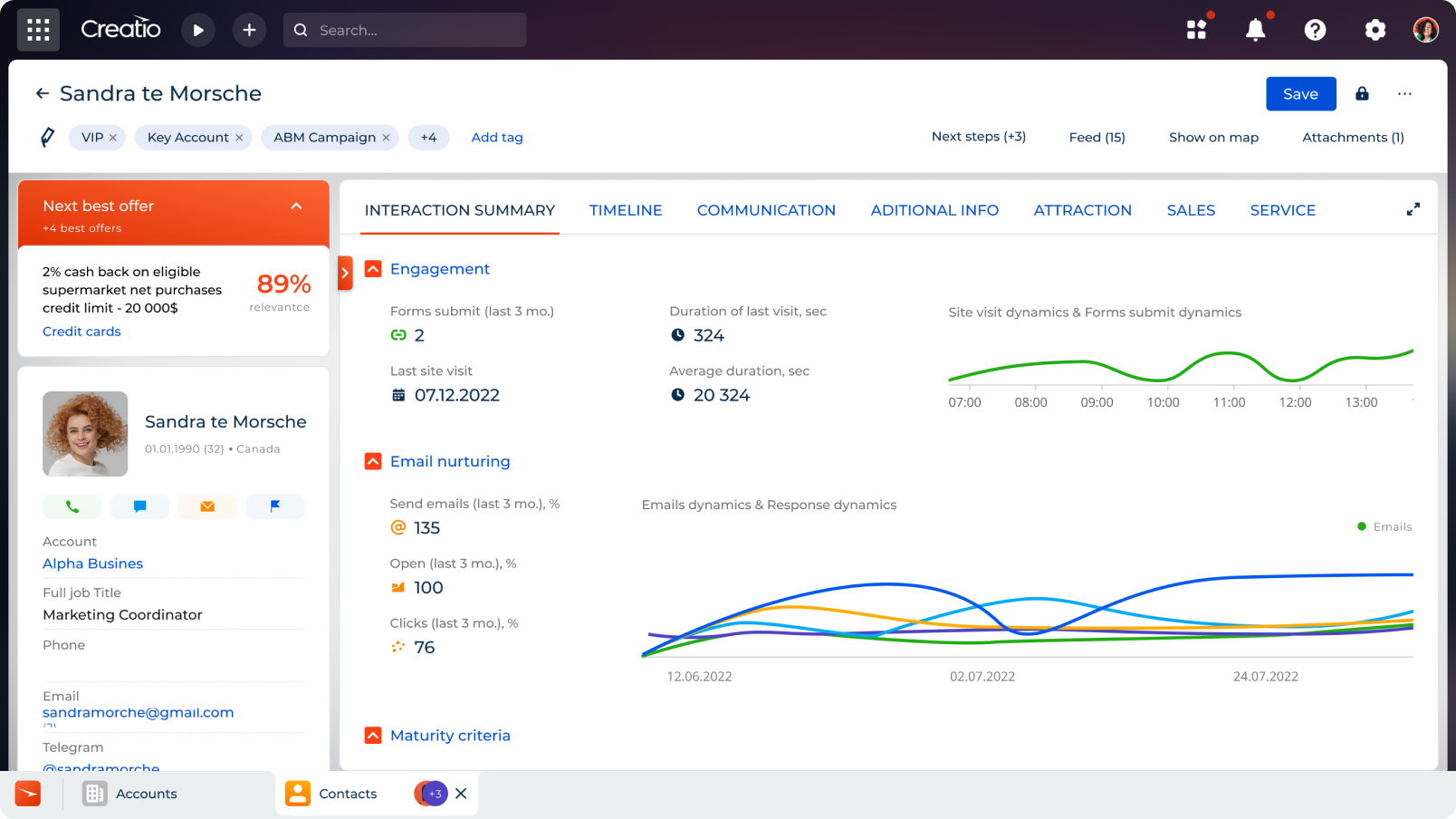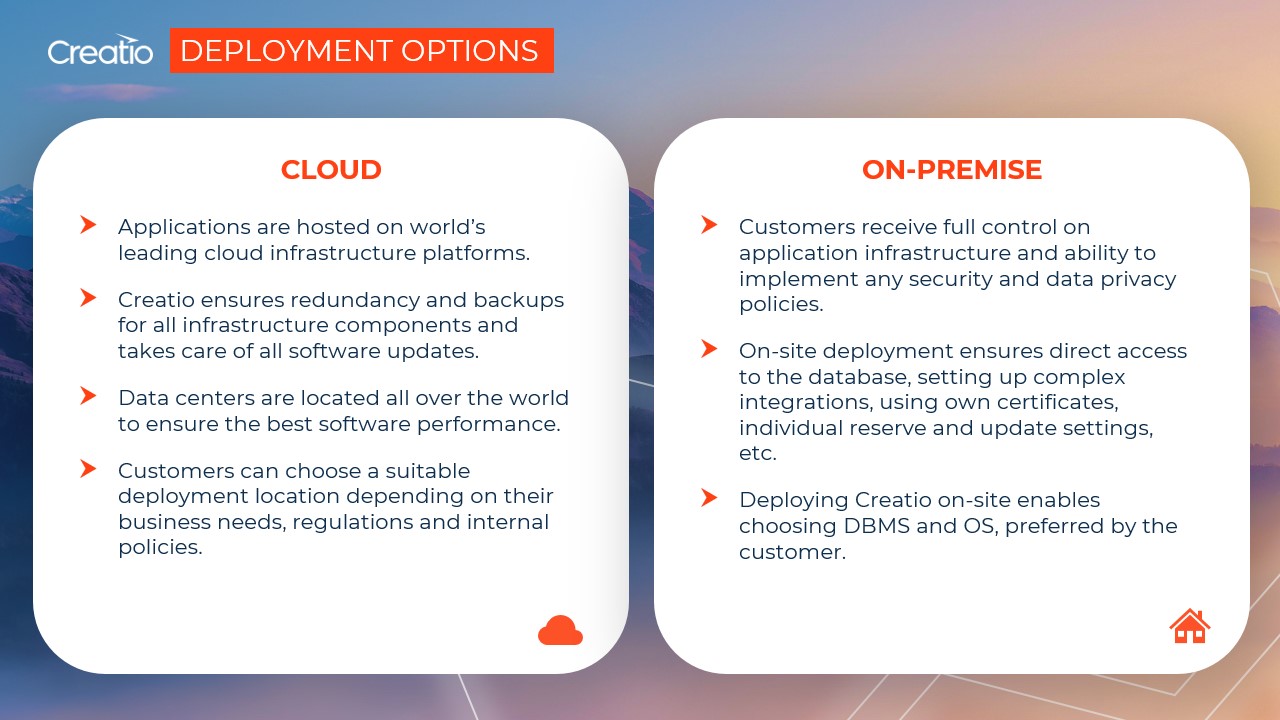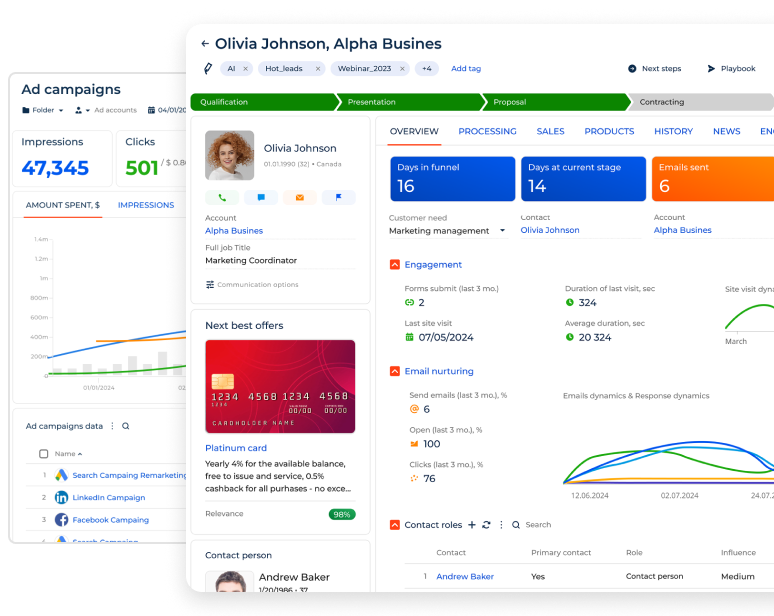-
No-Code
Platform
-
Studio
No-code agentic platform delivering the fastest time-to-value and the highest ROI
-
Studio
-
AI-Native CRM
CRM
-
AI-Native CRM
New era CRM to manage customer & operational workflows
CRM Products -
AI-Native CRM
- Industries
- Customers
- Partners
- About
Keep Your Data Under Control With Creatio’s On-Premise Deployment

Many factors come into consideration when choosing the right CRM system for your business: you need to determine your budget, the necessary features, and, of course, the deployment model. Some vendors offer only one type of deployment, be it an on-premise or a cloud-based CRM system. For this reason, you need to decide what implementation model fits your company and business goals best before signing up for demos and making the purchasing decision.
In this article, we go through the characteristics of on-premise CRM solutions, highlight its advantages and disadvantages, and explain which cases call for on-premise CRM vs cloud-based software.
What is an On-Premise CRM vs Cloud CRM?
An on-premise Customer Relationship Management (CRM) is a software solution that's installed on your servers and computers as an on-site CRM and is used for organizing customer data and managing business processes, primarily used by front-office teams such as sales, marketing, and customer service. This type of CRM is installed and runs on your organization's own servers and devices. With on-premise CRM software, all customer data is stored locally on your servers, allowing access without the need for an Internet connection.
A cloud-based CRM platform serves the same functions as on-premise CRMs, supporting front-office operations by organizing and streamlining customer data and engagement, but the CRM data is hosted on the CRM vendor's servers and can be accessed through the Internet, providing flexibility and remote accessibility.
The main functionality of the two CRM types is the same overall:
- support your entire sales process by automating pipeline management, lead generation, scoring, and sales forecasting;
- help you build personalized marketing campaigns,
- provide contact management, case routing, and task management features for customer support teams,
- and showcase analytics and insights to empower business decisions.
However, the distinction between on-premise CRMs and a cloud-based system goes beyond the storage of CRM data. In the next section, we'll discuss the main functional differences between cloud-based and on-premise CRMs and their advantages and disadvantages.
What's the Difference Between On-premise and Cloud CRM?
On-premise CRMs | Cloud-based CRM | |
| Cost structure | The initial cost is higher, but the consequent payments are typically much lower. | You pay the same amount each month based on the number of users and features available to you. |
| Integrations | Your in-house developers can build custom integrations with the software your company already uses. | Most often you only have access to the integrations provided by the vendor. |
| Customization | Deep customization supported by in-house developers. | Limited customization (unless you're using no-code CRM). |
| Customer support | Limited customer support that may end after implementation. | Reliably available customer support. |
| Accessibility | Typically, the software is available from the company's offices and company-owned devices. | Available from any device with Internet access. |
| Access to upgrades | An in-house software development team is needed to design and install updates. | Installed by the vendor automatically or after an opt-in from you. |
| Security and ownership | You own the software, and its security is controlled by you. | You own the license to the software, and the vendor provides the security measures. |
Cost structure
Nowadays, most CRM systems are sold as a subscription. However, there are some differences between an on-premise and cloud-based CRM subscription. Usually, purchasing an on-premise CRM license requires a sizeable payment upfront, but after implementation, you pay a smaller fee than with a cloud CRM. With the latter, you choose a plan with the number of users and features needed and then pay consistently the same price unless you decide to upgrade your plan, or the CRM provider changes its pricing. This makes on-premise solutions more low-cost in the long run but presents high upfront costs many businesses can't afford.
Integrations
Integration with other software enables you to connect your CRM with communication services, accounting or ERP software, and other programs in your existing infrastructure. A cloud-based CRM typically includes built-in connectors for the most popular programs and a Marketplace where you can purchase industry-specific integrations for an additional price. Integrations for on-premise CRM are usually developed separately by in-house developers or an outsourced developer firm.
Customization
A cloud-based CRM usually provides only limited options for customization, such as creating custom dashboards, data fields, and reports, unless you purchase a no-code CRM, which allows you to build your own sales process automation, workflows, and business apps without any technical skills. An on-premise CRM can be customized freely, as many on-premise CRMs offer open-source code access, but you need a software development team to design and implement these customizations.
Software updates
A cloud CRM is regularly updated by the vendor to include new features and the latest security measures. While you may have the option to opt out of specific updates, most updates are automatically implemented without your direct control. In contrast, since an on-premise solution is installed on your own servers, you have complete control over the updates, allowing you to decide which updates to implement, when, and how. However, this control necessitates having an in-house IT team to manage and execute updates for the on-premise CRM.
Ownership and security
With an on-premise CRM, you have complete ownership and control over your CRM data and processes, including access management. While on-premise CRMs typically come with built-in application security measures and protocols, the overall security level ultimately depends on your efforts to maintain and enhance it.
A cloud-based CRMs store customer information on the vendor's servers. Although you retain ownership of your data, accessing it can become challenging if the vendor experiences technical difficulties. The vendor is responsible for data security and should provide robust security protocols and certifications to demonstrate their commitment to protecting your data.
When to Use an On-Premise CRM?
On-premise CRM systems can offer unique benefits for all kinds of establishments in the right situations. If one of these cases is relevant to your business, consider purchasing an on-premise CRM solution:
- Public offices and governmental agencies: Since an on-premise CRM gives you complete ownership of the data, it's ideal for high-security environments. Organizations with strict security and compliance requirements may be prohibited from involving third parties.
- Operations in areas with limited Internet access: Suitable for remote locations, on-premise CRM systems allow users to work offline and synchronize data once they reconnect to the Internet or network, whereas cloud-based CRMs require constant Internet access.
- Integration with proprietary software or complex technical infrastructure: While cloud CRMs offer some integration capabilities, they can face challenges in more intricate environments or when connecting to the software developed by your company. On-premise CRMs are better suited for linking across a diverse, complex software ecosystem.
- Preference for lower ongoing payments: Some companies plan to save money by spending a lot on the initial cost of on-premise CRM systems while paying less in the long run.
- The need for extensive customization: Some customization requests can go beyond what no-code tools or CRM vendors offer. On-premise CRMs provide greater flexibility for tailored solutions.
However, before you make the decision it's important to understand all the drawbacks that come with an on-premise CRM. Here are the main disadvantages that may influence your decision:
- Requires an in-house or outsourced IT team to maintain and update
- High upfront costs which make it inaccessible to small businesses
- Time-consuming to implement
- Can only be accessed from the devices the on-premise CRM was installed on
- Increases the risk of data loss since the data is stored in one place
When to Use Cloud-Based CRM?
There are many cases in which purchasing an on-premise CRM will not be the best decision for your company. This list presents the advantages of cloud-based CRM and highlights the cases in which it will be a better choice of software.
- Mobile workforce: Ideal for businesses with remote teams or employees who travel frequently. Cloud-based CRMs provide access to the system from anywhere with an Internet connection, supporting flexibility and mobility.
- Scalability: Companies experiencing rapid growth or seasonal fluctuations in demand will benefit from the easy scalability provided by cloud-based CRMs. They can accommodate changing needs without significant infrastructure changes.
- Preference for lower initial costs: Cloud-based CRMs typically have lower initial costs, with a subscription-based pricing model that spreads expenses over time. For this reason, small businesses often prefer cloud-based CRM systems.
- Quick deployment: Cloud-based tools can be deployed more quickly than on-premise solutions, reducing the time to start using the system.
- Automatic updates and maintenance: The CRM vendor manages updates, security patches, and general maintenance, ensuring the system is always up-to-date without requiring in-house IT resources.
- Disaster recovery and data backup: Cloud CRMs often include robust disaster recovery and data backup services, providing peace of mind and ensuring business continuity in case of data loss or system failures.
- Reduced IT burden: Since the CRM vendor handles the technical aspects, you don't need to hire an extensive IT staff.
- Enhanced security by vendor: Vendors of cloud CRMs often invest heavily in security measures and certifications, ensuring high levels of data protection that might be challenging for individual companies to implement on their own.
Disadvantages of cloud CRM solutions:
- Over-reliance on the CRM provider
- The performance depends on your Internet connection
- Limited control over updates
- Recurring payments that may result in a higher overall cost
- Potential for downtime during maintenance or technical difficulties
Grow Your Business with Creatio's CRM
Creatio can accommodate any requirements you have since it offers both types of deployment: you can install Creatio CRM on-site or use it via the cloud.

The screenshot of Customer 360 dashboard from Creatio CRM
Moreover, Creatio's unique composable architecture that incorporates state-of-the-art no-code tools supported by Generative AI eliminates the need for professional developers for the customization or updates of an on-premise CRM. You can build custom CRM tools utilizing drag-and-drop components without any coding knowledge.

Creatio's deployment models include on-site and cloud options






















































